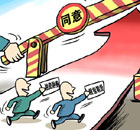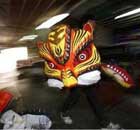Op-Ed Contributors
Cooperate to make women actors of peace and security
By Catherine Ashton, Anders Fogh Rasmussen and Margot Wallstrom (China Daily)
Updated: 2010-01-26 07:50
 |
Large Medium Small |
Sexual violence has become a tool of modern warfare. The victims are women of all ages, but often young girls; and the results are unwanted pregnancies, HIV infection and social stigmatisation.
Between 20,000 and 50,000 women are estimated to have been raped during the war in Bosnia in the 1990s. In Liberia, a country ravaged by war for decades, 3 out of 4 women have been exposed to sexual violence. In the province of South Kivu in the Democratic Republic of Congo, 40 rapes are reported every day.
| ||||
Starting with a co-hosted conference in Brussels on 27 January, the European Union and NATO want to focus greater attention on this issue and to identify concrete steps towards ending sexual violence in war, empowering women, and highlighting their vital role in restoring stability.
A sound legal framework already exists for such steps, in the form of United Nations Security Council Resolution 1325 on women, peace and security and a string of subsequent UN resolutions, including the decision to appoint a new UN Special Representative to coordinate efforts of the international community in this field.
Regrettably, implementation is lagging behind and greater efforts are clearly needed to ensure that more nations fulfill their obligations, in particular by training military and civilian staff on gender equality issues.
The adoption of the Lisbon Treaty has created fresh opportunities to boost gender objectives in the EU's external action. The new High Representative for Foreign Affairs and Security Policy will be able to build on the EU's strong basis from 2005, which ensures that gender aspects are part of the planning and conduct of EU crisis management actions, both military and civilian. For instance, the EUFOR Tchad/Republic of Central Africa's gender adviser trained the operation's military staff and had regular contacts with local women; EULEX Kosovo has a dedicated Human Rights and Gender Unit, whilst the new mandate of the EU Police mission in the Democratic Republic of Congo puts a strong focus on the fight against sexual violence. Similarly, gender aspects are integrated into the EU's external assistance, allowing, for example support to women participation in peace negotiations in countries as diverse as Nepal, Israel, Palestine, the Democratic Republic of Congo, Indonesia, Uganda and Kosovo.
Together with its partner countries, NATO is also examining its policies and program, and looking to enhance its cooperation with other international actors. The NATO Strategic Commanders recently issued a military directive for the implementation of UNSCR 1325 in all NATO-led operations. Gender adviser posts have been created to assist senior commanders in Afghanistan. And out in the field, specialist women teams have been very successful at establishing mutual trust between the NATO-led forces and local communities. Still, more work must be done also by NATO to build the necessary capabilities and to fully integrate gender perspectives.
We hope that our conference on 27 January will encourage further progress. We want to ensure that all EU and NATO-led operations continue to comply with UN resolutions relating to women, peace and security, and that they are supported by appropriate education, training, monitoring and evaluation mechanisms. And we will continue to highlight the important role of women in security in the run-up to the 10th Anniversary of UN Resolution 1325 later this year, as well as in our future work.
Ultimately, unless we enhance the rights and responsibilities of women globally, many of our foreign policy goals will remain unachievable, and those we do achieve will turn out to be unsustainable. Only if we work together - internationally, regionally and with civil society - will we be able to combat the marginalisation of women that is a real threat to global security.
Catherine Ashton is High Representative and Vice-President of European Commission.
Anders Fogh Rasmussen is Secretary General of NATO.
Margot Wallstrom is Vice-President of European Commission.
(China Daily 01/26/2010 page9)












